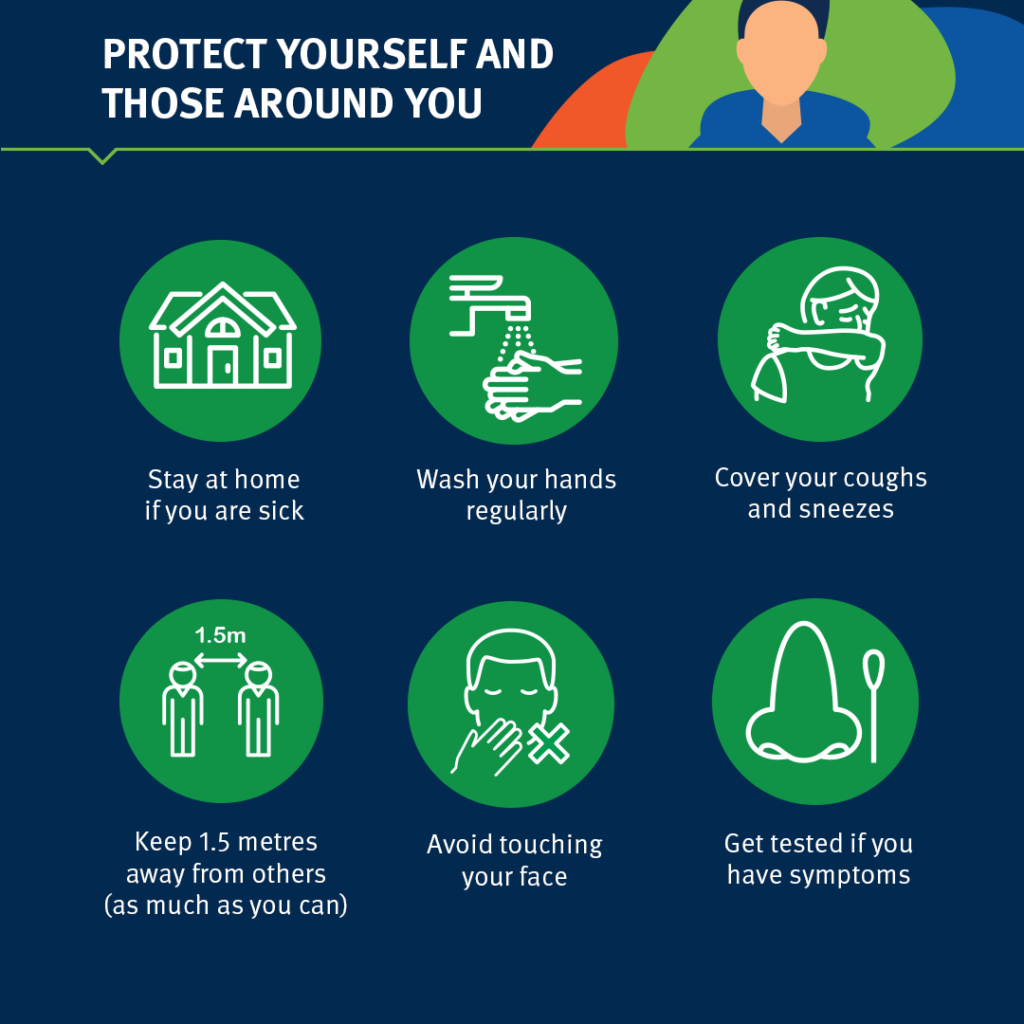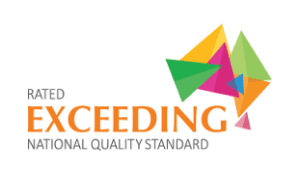COVID-19 - updated 2 May 2022, review due 27 May 2022
Protection
Protect yourself and those around you.

Symptoms
People with COVID-19 may experience symptoms such as:

It is important that approved providers prepare for managing a confirmed case as part of their service’s COVID-19 risk mitigation strategy.
For an outline of the process should a child, family member, educator or staff member test positive for COVID-19 and steps you can take now to prepare, click here.
The Record of Suspected, Confirmed Cases and Close Contacts of Novel Coronavirus COVID-19 will be maintained by the Kindy.
The National Framework for Managing COVID-19 in Schools and Early Childhood Education and Care states that ECEC services are essential and should be the first to open and last to close wherever possible.
In a continued effort to reduce regulatory burden, enforcement of a number of notification and application requirements are temporarily paused in Queensland until 27 May 2022:
1. you do not need to notify of positive cases in educators, staff, children or families under regulation 175(2)(c);
2. you do not need to notify of a change to hours or days of operation of a service under regulation 175(2)(a), if the change is due to COVID-19 related staffing issues, and is of less than seven days duration;
3. you do not need to apply for a temporary staffing waiver if your service is unable to temporarily meet qualification requirements under reg 126(1)(a) where this is due to COVID-19 related staffing absence, ratios are met, and the period is for less than seven days.
This means that, if your Diploma-qualified educator is off work due to COVID, you can replace them with a Certification III qualified educator for a period of up to seven days without requiring a waiver.
However, you must ensure that all other requirements are met, including ensuring that a suitably qualified responsible person is present, a staff member holds approved first aid qualifications, ratios are met, staffing records are kept and adequate supervision is ensured at all times.
You are encouraged to undertake a risk assessment to ensure that all requirements are appropriately met.
These are temporary arrangements only, and have been implemented to support service operations in response to the special circumstances faced by services as a result of the Omicron wave.
Arrangements will be in place until 27 May 2022 and will be reviewed during that period.
As always, children’s health, safety and wellbeing remains the highest priority, and the Regulatory Authority will continue to monitor for compliance with all aspects of the National Law during this period.
From 6pm Thursday, 28 April 2022, the Isolation for Diagnosed Cases of COVID-19 and Management of Close Contacts Direction (No. 7) has been updated to remove the requirement for close contacts to quarantine, provided they do not have any symptoms of COVID-19.
Queensland Health have issued new Guidelines for Close Contacts in Queensland to support the Direction. These guidelines outline symptomatic and non-symptomatic close contacts the requirements and recommendations.
When determining whether someone is a close contact, it is important to note that early childhood services are not considered a household, or household-like accommodation or care facility.
New requirements
If you are a close contact who is asymptomatic, you will no longer need to quarantine.
However, in the 7 days after becoming a close contact you will need to:
- wear a face mask while outside of your home, including outdoors if you cannot physically distance
- notify your employer that you are a close contact. Parents/carers of a child in an early childhood setting must let their service know
- not visit vulnerable settings, such as hospitals, aged care and disability facilities, unless in exceptional or compassionate circumstances (for example, end of life visits).
Please note schools and early childhood settings are not considered vulnerable settings.
It is recommended that you undertake a COVID-19 test on the first day you leave home, and every second day (e.g. days 2, 4, and 6) until you are no longer a close contact.
If you are a close contact with COVID-19 symptoms, you must stay at home. You will need to get tested and isolate until your symptoms resolve.
For a confirmed positive case of Covid-19, click here to confirm what the next steps are with regards to:
- ending isolation and/or;
- being exempt from being a close contact for a 4 week period.
On 24 January 2022, the Queensland Health directive relating to mandate vaccination came into effect. See below for requirements relating to the kindy.
The Covid-19 Vaccination Requirements for Workers in a High-Risk Setting Direction includes the following definition of a ‘worker’ in regards to who must comply with the direction.
A Worker includes a person who:
- is employed at a high-risk setting on a part-time, casual or full-time basis; or
- is a government employee whose duties involve attendance at a high-risk setting; or
- undertakes work, whether paid or unpaid, at the high-risk setting; or
- is a contractor providing services to or at the high-risk setting; or
- is a corrective services facility visitor; or
- is attending the high-risk setting in the context of duties relating to the administration, regulation, governance, managerial oversight, or legal framework relating to the high-risk setting; or
- is a performer, presenter or other specialist entering the high risk setting as part of delivering an activity, function or event; or
- is a volunteer delivering a service in the high-risk setting; or
- is undertaking a work placement related to an enrolled course of study.
Examples: a contractor, union official, regulator, auditor, courier, performer, school crossing person, or sales representative must comply with the COVID-19 vaccination requirements to work in a high risk setting even though they may only occasionally enter the setting as part of their work duties.
Note: A worker who visits a high-risk setting as an incidental part of their duties but is not providing services within the high-risk setting, such as a delivery driver or taxi driver is not a worker at a high-risk setting.
A parent / guardian is not required to be vaccinated and are able to attend and enter the Service.
One way of viewing this is looking at that the parent/guardian is a client or a consumer and they are attending the service to access education and care for their child.
A parent/ guardian is therefore able to attend for drop off and pick up, attend to discuss their child’s engagement in the program and receive information about the program.
The context in which a parent/ guardian is required to be vaccinated is where they move into the ‘volunteer’ category of the Health Directive, for example if a parent/guardian was to come and assist on parent roster which is supporting the overall service, visit to share a hobby / occupation or skill such as facilitating a group time or undertaking a gardening project with the group then they would be required to be vaccinated.
Executive Committee Members that are attending the high-risk setting in the context of duties relating to the administration, regulation, governance, managerial oversight, or legal framework relating to the high-risk setting are required to be vaccinated.
Therefore an Executive Member who is not vaccinated would only be able to undertake their duties remotely, this can be via video platform, phone calls and emails.
It is appreciated that this person may hold a dual role as a parent of the Service and therefore they are able to attend the Service as a parent, without requiring to be vaccinated. In this context a Service would have clear communication systems so that when on site, the parent is able to engage in being present as a parent only, not as an Executive Committee Member.
The impact on the governance structure will be dependent on each kindergarten community and Committees can discuss with the Nominated Supervisor whether this could work in their own context and operation of the Kindergarten.



